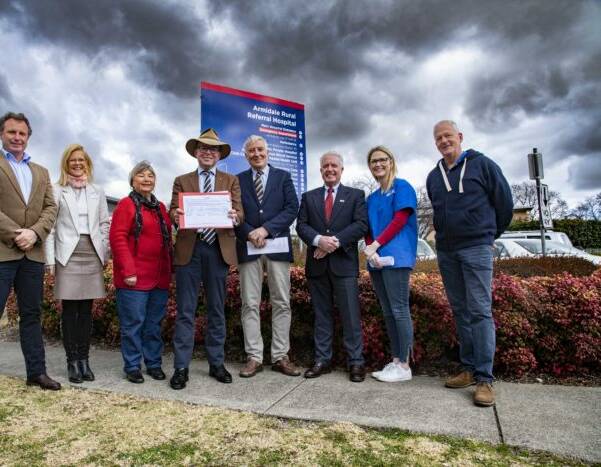
CALLS to split the Hunter New England health district in two are politically-based with no clear gains for affected communities, according to health economist Francesco Paolucci.
The benefits of a centralised healthcare system, in terms of funding and service provision, have been proven during the COVID pandemic, he said.
"The lessons that have been learnt during the pandemic are that high degrees of centralisation deliver significant improvements, not only in funding and efficiency, but also in access and fairness," Professor Paolucci said. "The idea of separating HNE in the way that's being proposed is fundamentally baseless. The only clear rationale for it is political opportunism."
Communities would be exposed to a higher risks of long waits and inequitable access simply because there would be another local health district which would be quite costly from an administrative perspective, Professor Paolucci said.
Northern Tablelands MP Adam Marshall gathered with representatives of four councils as well as the Armidale Branch President of the NSW Nurses & Midwives Association, Michelle Chappell, on Tuesday to launch a petition to demand "drastic change and improvements" in health services and staffing levels across his electorate.
"It is blindingly obvious that a corporate structure based in the Hunter at Newcastle, has little regard for those communities on the outskirts, with some centres almost 700km away from the head office," Mr Marshall said. "The current management structure is failing ... we have to do better."
However, Professor Paolucci, a health economist with the University of Newcastle and the University of Bologna, Italy, said the Hunter New England local health district had been performing well for a very long time, in terms of managing public resources and responding to the needs of the populations it serves.
"This is demonstrated from a pure budget perspective, which is quite important at a time like this," he said. "Globally the trend towards smaller communities having to deliver on their own have proven to be ineffective."
A statement from Hunter New England LHD said the amalgamation of Hunter New England LHD in 2005 led to a reinvestment into improving front line clinical care, particularly in rural and regional areas, and there would be significant costs associated with replicating services and management positions.
Staff regularly take secondments to rural and regional ares to help fill short-term vacancies as well as providing outreach clinics and supporting clinical support across the district, the statement said.







